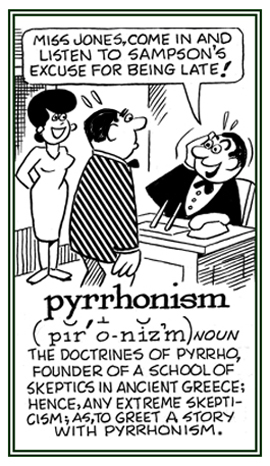English Words in Action, Group P
(a variety of English words which have developed through history and are currently used in our modern age)
Simply click on this banner (or the following link) and you will be on your way to stimulate your brain for greater word comprehension with quizzes based on some of the words in this unit.
1. Someone who makes comments or judgments; especially, in an authoritative manner; a critic or a commentator: The elected minister presented himself as a pundit about all areas of environmental conservation.
2. People who know a great deal about particular subjects and who express their ideas and opinions about those topics publicly; such as, by speaking on television and/or radio programs: The governor and his colleagues often appeared on television as pundits regarding water front development and its prospects for greater tax income.
3. A learned person, an expert, or an authority: The chairperson of the Religion Department at the university was considered a pundit on the topic of South Asian religions.
4. Etymology: from Hindi pandit from Sanskrit pandita, "learned, well informed".

© ALL rights are reserved.
Go to this Word A Day Revisited Index
2. People who know a great deal about particular subjects and who express their ideas and opinions about those topics publicly; such as, by speaking on television and/or radio programs: The governor and his colleagues often appeared on television as pundits regarding water front development and its prospects for greater tax income.
3. A learned person, an expert, or an authority: The chairperson of the Religion Department at the university was considered a pundit on the topic of South Asian religions.
4. Etymology: from Hindi pandit from Sanskrit pandita, "learned, well informed".

Go to this Word A Day Revisited Index
so you can see more of Mickey Bach's cartoons.
1. An expression of expert opinions: The punditry of the political analyst on TV helped to clarify several of the issues regarding the Presidential campaign for a better understanding by the general public.
2. Comments or judgments; especially, authoritative ones: One goal of the speaker was to provide the audience with punditry so they could make better decisions about who they would vote for.
2. Comments or judgments; especially, authoritative ones: One goal of the speaker was to provide the audience with punditry so they could make better decisions about who they would vote for.
1. Skepticism or an attitude of doubting the truth about something: Jacob's mother had a Pyrrhonism when he told her that he was the only one in his class who got 100% right on a quiz that his class had about vocabulary words.
2. Etymology: from Greek Pyrrhus and from Latin Pyrrhicus "a victory that is gained at a great cost" which involved a victory of Pyrrhus over the Romans at Heraclea in 279 B.C. (Before Christ) or 279 B.C.E. (Before the Christian Era).

© ALL rights are reserved.

© ALL rights are reserved.
Go to this Word A Day Revisited Index
2. Etymology: from Greek Pyrrhus and from Latin Pyrrhicus "a victory that is gained at a great cost" which involved a victory of Pyrrhus over the Romans at Heraclea in 279 B.C. (Before Christ) or 279 B.C.E. (Before the Christian Era).


Go to this Word A Day Revisited Index
so you can see more of Mickey Bach's cartoons.
1. A female soothsayer who makes predictions about what is going to happen in the future: Mike paid a visit to a local pythoness to see if she could really present him with anything that was significant about what would actually take place at some later date.
2. Etymology: from Greek puthon and from an alteration of Latin pythonissa, "a soothsaying demon."

© ALL rights are reserved.
Go to this Word A Day Revisited Index
2. Etymology: from Greek puthon and from an alteration of Latin pythonissa, "a soothsaying demon."

Go to this Word A Day Revisited Index
so you can see more of Mickey Bach's cartoons.
Links to all of the groups of English words in action, Groups A to Z.
You may see the bibliographic list of sources of information for these words in action.

